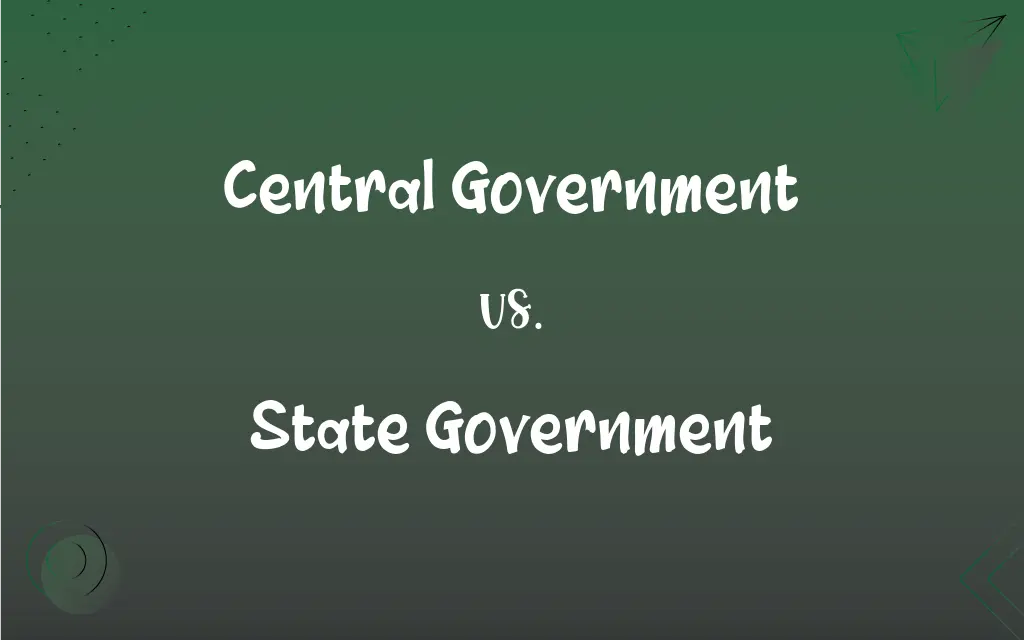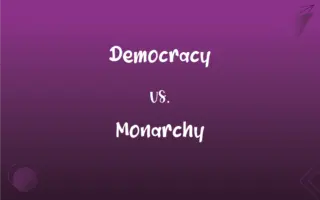Central Government vs. State Government: What's the Difference?
Edited by Aimie Carlson || By Harlon Moss || Updated on October 2, 2023
Central government manages a nation at a national level, while state government operates at a regional or subnational level within a nation's states or provinces.

Key Differences
Central government entails an administrative authority managing nationwide policies, ensuring uniform governance, and international diplomacy, whereas the state government orchestrates regional administration within defined territorial boundaries, balancing local needs with national directives. Both entities, while delineated, collectively scaffold the nation's governance, addressing various administrative, legislative, and jurisdictional spectrums at different levels.
While the central government endeavors to formulate and implement policies with nationwide ramifications, ensuring cohesiveness, national security, and international relations, state government endeavours to cater to regional particulars, addressing local needs, cultural nuances, and specific demographic requisites, thereby embracing a more localized governance approach.
The central government, by managing defense, foreign affairs, and national policies, ensures nationwide security, stability, and international representation, whereas state government, by managing local public services, resources, and infrastructures, ensures territorial developmental, administrative, and legislative requisites are aptly addressed.
Central government, with its broad jurisdiction, amalgamates national interests, addressing overarching economic, social, and political facets, whereas state government aligns national directives with regional interests, ensuring that local cultures, needs, and socio-economic dynamics are adequately represented and managed.
In a federal system, the central government and state government often work in tandem, whereby the central government provides overarching national frameworks and the state government adapts and implements these within the regional context, ensuring governance is resonant with local and national interests.
ADVERTISEMENT
Comparison Chart
Level of Operation
National level
State or provincial level
Jurisdiction Scope
Nationwide
Confined to a particular state or province
Policy Focus
National and international policies
Local and regional policies
Representation
Represents the country internationally
Represents the state within the nation
Managed Areas
Defense, foreign affairs, national policies
Local public services, regional resource management
ADVERTISEMENT
Central Government and State Government Definitions
Central Government
Administrative authority managing a nation.
The central government handles international diplomatic relations.
State Government
Administrative body managing a particular state or province.
The state government implemented a new local healthcare initiative.
Central Government
Umbrella authority for national legislative and judiciary matters.
The central government enacted a law affecting all states.
State Government
Entity managing local policies, services, and resources.
The state government allocated funds for road development.
Central Government
Representative authority in international arenas.
The central government negotiated a trade deal with a neighboring country.
State Government
Administrative authority handling local public services.
The state government ensured that public transportation services were regular.
Central Government
Entity managing national policies and regulations.
The central government imposed new nationwide tax regulations.
State Government
Representative authority managing state-specific cultural and social aspects.
The state government organized a festival celebrating local culture.
Central Government
Governance body managing national defense and security.
The central government is responsible for national defense strategies.
State Government
Governance body responsible for regional legislative matters.
The state government passed a law regarding local education standards.
FAQs
What is the central government?
The central government is the overarching governing body that manages an entire nation and its various functions.
Can the central government regulate state governments?
Yes, the extent to which it can regulate state governments often depends on a country's constitution.
Does the central government control fiscal policies?
Yes, it usually determines and implements fiscal policies at a national level.
How does the central government impact foreign relations?
It handles international affairs, diplomacy, and foreign policy decisions.
What roles does the central government play?
It manages national policies, defense, foreign affairs, and often oversees economic strategies.
How is the central government formed?
Typically, members of the central government are elected through nationwide elections.
Who leads the central government?
Leadership can be a president, prime minister, or a similar role, depending on the country's political structure.
Can state governments engage in foreign diplomacy?
Typically, no. Foreign affairs are usually managed by the central government.
How do state governments interact with central government?
Interaction often involves negotiating allocations, managing state matters, and ensuring compliance with national laws.
Are state government actions influenced by central government policies?
Yes, state actions and policies can be shaped by central government directives and national legislation.
What are the limitations of a central government?
Limitations may pertain to jurisdictional bounds and specific powers distributed to state or local governments.
How autonomous is a state government?
Autonomy can vary widely, often defined by a nation’s constitution, but it generally has control over localized matters.
What functions does the state government serve?
It typically manages local infrastructure, education, policing, and various state-specific matters.
How do state governments fund their initiatives?
Funding often comes from state taxes, federal allocations, and sometimes internal revenue-generating activities.
Can the central government levy taxes?
Yes, it usually establishes and collects national taxes.
Is the central government responsible for the national defense?
Yes, it typically manages the nation's defense and military apparatus.
Who leads the state government?
Often, a governor or a similar role leads the state government.
Can state governments create laws?
Yes, they usually legislate on matters within their jurisdiction, subject to national laws.
What is a state government?
State government operates at a sub-national level, managing and legislating within its territorial boundary.
How is the state government formed?
Members are typically elected through state elections, with systems varying by country.
About Author
Written by
Harlon MossHarlon is a seasoned quality moderator and accomplished content writer for Difference Wiki. An alumnus of the prestigious University of California, he earned his degree in Computer Science. Leveraging his academic background, Harlon brings a meticulous and informed perspective to his work, ensuring content accuracy and excellence.
Edited by
Aimie CarlsonAimie Carlson, holding a master's degree in English literature, is a fervent English language enthusiast. She lends her writing talents to Difference Wiki, a prominent website that specializes in comparisons, offering readers insightful analyses that both captivate and inform.































































